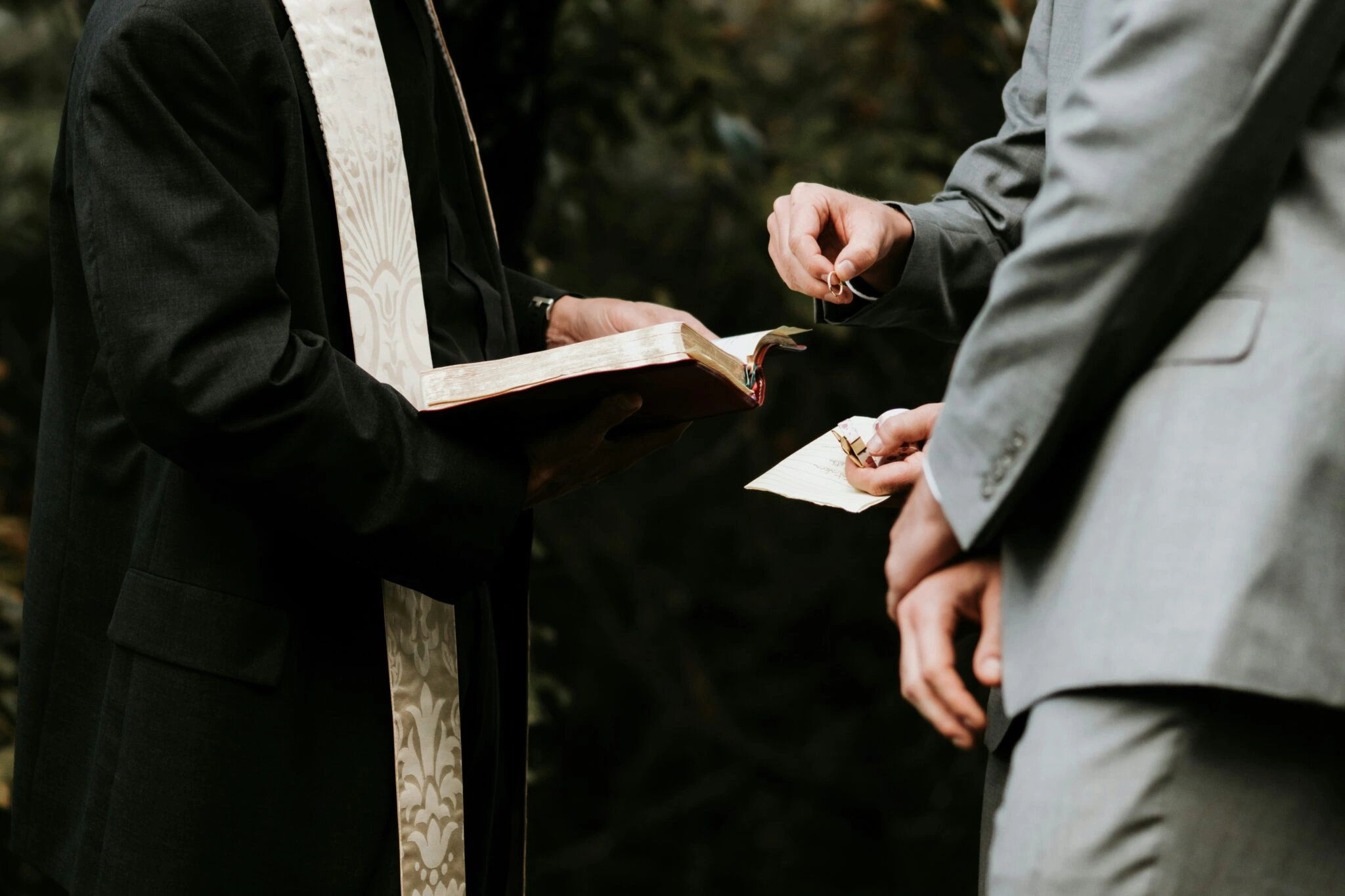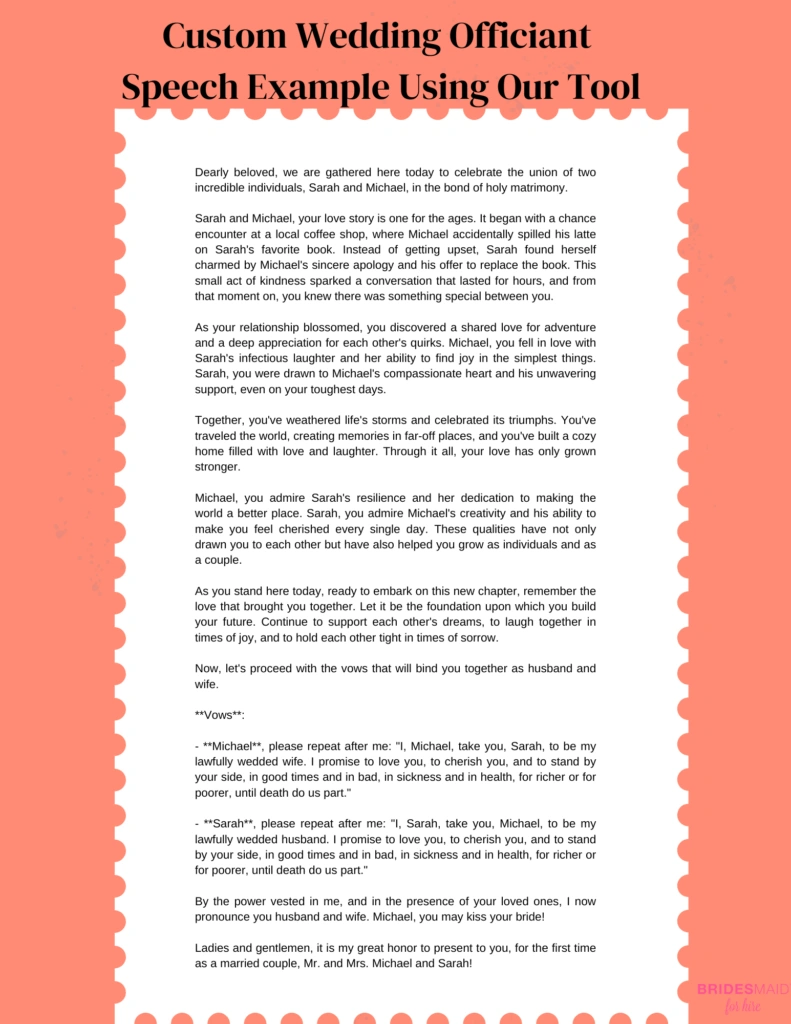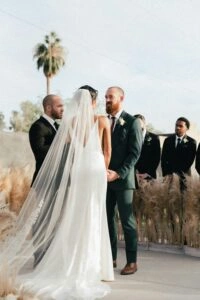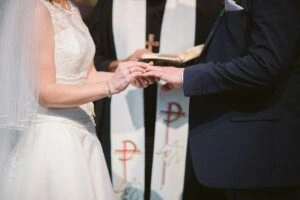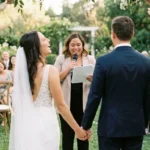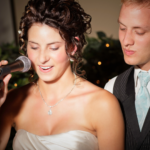Hi, Friend. Jen Glantz here. Becoming a wedding officiant is so rewarding. You get to have such unique experiences and be part of really special moments. Whether you want to officiate your friend’s wedding or start your own officiant business, it’s important to understand everything that goes into this role. In this guide, we’ll cover all you need to know about how to become a wedding officiant in 2025. We’ll talk about the legal stuff you need to do, how to prepare for the ceremony, tips for the actual wedding day, and even how to market your services. Let’s dive in together and get you ready to take on this exciting role!
Use these additional resources:
- Our handy Wedding Officiant Speech Generator
- Our comprehensive Wedding Officiant Speech Guide
- A list of Wedding Officiant Speech Jokes
- A list of Wedding Officiant Speech Templates
- A guide of Wedding Officiant Quotes
- How to craft a Funny Wedding Officiant Speech
TL;DR – The key steps to becoming a wedding officiant in 2025:
- Know what a wedding officiant does and is responsible for
- Get ordained and take care of any legal requirements for your state
- Meet with the couple and really prepare for their ceremony
- Perform the ceremony smoothly and handle the license afterward
- Market yourself and grow your officiant business
- Always keep learning and improving your skills
- Think about adding extra services like Bridesmaid for Hire to provide even more support
Understanding the Role of a Wedding Officiant
Okay, so a wedding officiant is the person who actually leads the wedding ceremony. They make sure the couple is legally married at the end of it all. But it’s way more than just reading the vows out loud. You have to really get to know the couple’s love story, work with the other vendors, and keep everything on schedule during the ceremony. Officiants can be religious leaders, government officials, or even the couple’s friends and family who get ordained just for the wedding. No matter who it is, the officiant’s main job is to create a ceremony that the couple will always remember.
What is a Wedding Officiant?
A wedding officiant has a really important job. They’re the one who guides the couple as they say their vows and makes sure their marriage is legal. It’s a big responsibility that goes beyond just the ceremony part. It’s about setting the right mood for one of the biggest moments of the couple’s lives. Officiants can be all sorts of people, from pastors who do this all the time to a friend or relative who just gets ordained online for that one special day. But no matter what, the officiant’s words and presence add so much to the couple’s wedding day memories.
Duties and Responsibilities
Being a wedding officiant is way more than just showing up on the big day. A lot of times, you help the couple write their vows, talk to the wedding planner and other vendors, and make sure all the legal paperwork is taken care of. During the actual wedding, the officiant leads the couple through the whole ceremony, makes sure it all flows nicely, and creates a really heartfelt vibe. After it’s all over, the officiant has to get the marriage license signed and turn it in to the right government offices.
Types of Officiants
Wedding officiants can come from all walks of life and each bring their own special touch to the ceremony. You’ve got religious officiants like priests, ministers, rabbis, and imams who do ceremonies that are full of spiritual traditions. Then there are civil officiants like judges who keep things more secular. A lot of couples these days are also having their friends or family members get ordained online to officiate, which makes it super personal and intimate.
Get a customized wedding officiant speech here >>
Legal Requirements and Certification for a Wedding Officiant
I know dealing with all the legal stuff to become a wedding officiant can seem overwhelming, but it’s really important. Every state has its own rules and you have to know them before you officiate any weddings. Most of the time, the first thing you need to do is get ordained. You can do this through a church or an online group like Universal Life Church or American Marriage Ministries. Once you’re ordained, you might have to register with the county clerk or some other government office, depending on where you live. We’ll walk you through all these steps so you’re totally covered legally to perform weddings.
Getting Ordained
Getting ordained is how you get the legal right to perform weddings. Lots of people choose to do it online because it’s easy and quick. Places like Universal Life Church and American Marriage Ministries let you get ordained in just a few minutes for a small fee. If you want to go the more traditional route, you can get ordained through a church or religious group. Either way, getting ordained is the very first step to becoming a wedding officiant.
Online Ordination
Online ordination has gotten really popular for people who want to become wedding officiants. Services like Universal Life Church and American Marriage Ministries make it super fast and simple. It usually only takes a few minutes and costs a small amount. These places give you a legal ordination certificate that works in most states, so you can start doing weddings right away without a big hassle. Because it’s so quick and easy, online ordination is a great choice for lots of new officiants.
Religious Ordination
If you want to officiate weddings within a specific religion, getting ordained through a religious institution is usually the way to go. This process can involve more in-depth training and following the specific teachings of the religious group. Religious ordination doesn’t just give you the legal right to do weddings, it also adds a lot of spiritual meaning to the ceremony. Whether you’ve been part of a religious community for a long time or you’re looking to deepen your spiritual practice, religious ordination can be a really meaningful and fulfilling path.
State-Specific Requirements
Every state in the U.S. has different requirements for wedding officiants. That’s why it’s so important to research and understand the rules in the state where the wedding will happen. Some states say you have to register with the county clerk or another government office. Others have specific paperwork or training you need to do. This section will help guide you through all these state-specific requirements so you’re totally prepared and can legally officiate weddings with no problems.
Stat: In Alabama, any licensed minister in regular communion with their church may perform marriages. This shows how important it is to know each state’s specific requirements (NACM).
Researching Local Laws
Researching the local laws is a key part of becoming a wedding officiant. Every state, and sometimes even each county, might have specific rules you have to follow. Start by going to the county clerk’s office or checking the state’s official website to find out what officiants need to do. Some states might make you register, turn in certain papers, or even do extra training. Doing your research thoroughly makes sure you’re following all the rules and are ready to officiate weddings legally with no issues.
Registration Process
In some states, you have to register with the local government to officially become a wedding officiant. This usually means sending in your ordination papers, filling out registration forms, and sometimes paying a fee. The exact steps can be really different depending on where you live, so always check with your county clerk or state government office. Finishing this registration means you’re legally recognized as a wedding officiant in your area.
Get a customized wedding officiant speech here >>
Preparing for the Ceremony as a Wedding Officiant
Being really prepared is the key to having a wedding ceremony that’s super memorable and meaningful. As the officiant, you’re doing way more than just reading the vows. You have to really connect with the couple, get their vision, and coordinate every part of the ceremony. This section will take you step-by-step through everything you need to do to prepare, from your first meeting with the couple to personalizing the ceremony and working with the other vendors. When you prepare thoroughly, the ceremony will totally reflect the couple’s unique love story and go smoothly on the big day.
Meeting with the Couple
One of the most important things you do to prepare for a wedding ceremony is meet with the couple. This meeting is where you really get to know their personalities, what they like, and what they want the ceremony to be like. Talk about all the big details like how the ceremony will be structured, any special traditions they want to include, and what they want in their vows. Building a good relationship with the couple makes sure the ceremony feels personal and special and really shows off their unique love story.
Discussing the Ceremony Structure
The way the ceremony is structured sets the whole tone for the wedding. When you meet with the couple, talk through the order of everything – the processional, any readings, the vows, exchanging rings, and any special rituals or traditions. Make sure the ceremony flows really well and includes anything specific the couple wants. Creating a ceremony structure that fits the couple’s personalities and preferences makes it a memorable and heartfelt experience for everyone there.
Customizing Vows
Customizing the vows is a chance to make the wedding ceremony truly one-of-a-kind and personal. Work with the couple to help them write vows that really reflect their love story, what’s important to them, and the promises they want to make to each other. Give them guidance on writing vows that are meaningful and heartfelt and fit the overall feel of the ceremony. Personalized vows add such a special touch to the ceremony and make it an emotional and unforgettable moment for the couple and their guests.
Rehearsal and Final Preparations
Having a rehearsal is so important to make sure the wedding ceremony goes off without a hitch. At the rehearsal, go through the entire ceremony with the couple, wedding party, and anyone else who’s involved. Make sure everyone knows their role, answer any questions, and double-check all the little details. Final preparations also mean coordinating with the other vendors like the wedding planner, photographer, and musicians to make sure the ceremony is seamless and runs on time. A good rehearsal and thorough final preparations lay the groundwork for a perfect and unforgettable wedding day.
Coordinating with Other Vendors
Coordinating with the other vendors is a key part of those final preparations for the wedding ceremony. Talk to the wedding planner, photographer, musicians, and anyone else involved to make sure you’re all on the same page. Go over the ceremony timeline, the important moments that need to be captured, and any specific things the couple wants or needs. When you coordinate well with the vendors, it creates a ceremony that’s seamless and well-orchestrated, letting the couple enjoy their special day without any stress.
Ps. Quick Resources to Tap Into:
- Use our wedding officiant scriptwriting tool.
- Start a Wedding Business Course can help you with a business plan, stand-out marketing techniques, and pricing methods.
What the Ceremony is Like as the Wedding Officiant
The actual ceremony is where all your preparation and coordination come together. As the officiant, your job is to lead the ceremony with confidence and authenticity, making sure it flows smoothly and really resonates with the couple and their guests. This section will guide you through the key parts of performing the ceremony, from the opening remarks to the vows and rings, and even the legal stuff after the ceremony. When you perform the ceremony flawlessly, it creates a memorable and heartfelt experience for the couple and everyone they love.
Get a customized wedding officiant speech here >>
Leading the Ceremony
Leading the ceremony is the officiant’s number one job. Start with a warm welcome and introduction to set the right mood for the whole event. Guide the couple through the ceremony, making sure each part flows smoothly and naturally. The way you speak and act should reflect the couple’s personalities and love story to create an intimate and meaningful experience. Remember, you’re not just talking to the couple, but to all their guests too. So make sure everyone feels included and engaged in the ceremony.
Delivering the Opening Remarks
The opening remarks set the tone for the entire ceremony. Start by warmly welcoming the guests and introducing yourself. Share a short reflection on what the day means and the couple’s journey together. Make your remarks personal to reflect the couple’s unique love story and add some warmth and intimacy. When you deliver thoughtful and heartfelt opening remarks, it creates a positive and engaging atmosphere for the whole ceremony.
Conducting the Vows and Rings Exchange
Guiding the couple through their vows and exchanging rings is a pivotal moment in the ceremony. Make sure each person has their vows ready and really understands how important they are. During the ring exchange, emphasize the symbolism and meaning behind this tradition. Speak slowly and clearly so the couple and their guests can fully take in the moment. This part of the ceremony is usually the most emotional and memorable, so take your time to create a truly heartfelt experience.
Signing and Submitting the Marriage License
After the ceremony, the marriage license needs to be signed and sent to the right government offices. This is a super important step to make sure the marriage is legally recognized. As the officiant, you’re in charge of guiding the couple and witnesses through the signing process. Make sure you get all the required signatures and double-check all the details for accuracy. Once it’s signed, you have to send the license to the office that issued it, usually the county clerk, within a certain time frame. This legal paperwork finalizes the marriage and makes sure the couple’s union is officially recorded.
Legal Documentation
Making sure all the legal paperwork is filled out correctly and submitted is a critical part of being a wedding officiant. This includes the marriage license and any other forms required by the state. Double-check all the details on the marriage license before the ceremony to avoid any mistakes. After the ceremony, guide the couple and witnesses through signing everything, making sure you get all the necessary signatures. Finally, submit the completed license to the issuing office by the deadline to ensure the marriage is legally recognized.
Post-Ceremony Considerations as a Wedding Officiant
A wedding officiant’s responsibilities don’t end when the ceremony does. After the wedding, there are a few important follow-up things to do to make sure everything is in order. These include offering continued support to the couple, checking that the marriage license has been processed, and answering any final questions or needs they have. Providing post-ceremony support can help the couple transition smoothly into married life and ensure their wedding day memories stay positive and cherished.
Providing Support and Follow-Up
Offering ongoing support and follow-up after the wedding is a valuable part of being a wedding officiant. Check in with the couple to congratulate them and make sure they’re happy with how the ceremony went. Answer any remaining questions they have and reassure them that all the legal aspects are taken care of. This follow-up helps build lasting relationships and shows your commitment to their happiness and well-being.
Post-Wedding Communication
Effective post-wedding communication means reaching out to the couple to congratulate them and address any final questions or needs. You can do this with a phone call, email, or even a handwritten note. Reassure the couple that all the legal stuff is handled and give them any additional resources or support they might need. Keeping the lines of communication open after the wedding helps ensure the couple’s satisfaction and reinforces your role as a trusted and supportive officiant.
Ensuring Legalities are Completed
Confirming that all the legal aspects are wrapped up is a key part of the post-ceremony process. Follow up with the issuing office to make sure they’ve received and recorded the marriage license. Give the couple any necessary paperwork or info, like how to get an official copy of their marriage certificate. Making sure all the legal details are handled properly gives the couple peace of mind and guarantees their marriage is officially recognized.
Get a customized wedding officiant speech here >>
Post-Ceremony Considerations as a Wedding Officiant
Building a successful wedding officiant business takes effective marketing and strategic growth efforts. Creating a strong personal brand, networking with other wedding pros, and offering unique and personalized services are all important for attracting clients and establishing your reputation. This section will walk you through the essential steps to market and grow your wedding officiant business, helping you stand out in a competitive industry and bring in a steady stream of clients.
Ps. Want to start your wedding officiant business this year but unsure of where to start? Our Start a Wedding Business Course can help you with a business plan, stand-out marketing techniques, and pricing methods.
Building Your Brand
Creating a strong personal brand is crucial for attracting clients and establishing your credibility as a wedding officiant. Start by making a professional website that shows off your services, testimonials, and contact info. Use social media platforms like Instagram, Facebook, and LinkedIn to connect with potential clients and share your work. Consistent branding, including a professional logo and cohesive visual style, helps build recognition and trust. Building your brand effectively lays the foundation for a thriving wedding officiant business.
Creating a Professional Website
A professional website serves as your online portfolio and is essential for attracting clients. Include sections for your services, testimonials from past clients, a portfolio of ceremonies you’ve done, and clear contact information. Use high-quality images and engaging content to showcase your personality and expertise. A well-designed website not only gives potential clients valuable information but also establishes your credibility as a professional wedding officiant.
Utilizing Social Media
Social media platforms like Instagram, Facebook, and LinkedIn are powerful tools for marketing your wedding officiant business. Share photos and videos from past ceremonies, client testimonials, and behind-the-scenes content to engage with potential clients. Use hashtags and location tags to increase your visibility and reach a wider audience. A consistent and authentic social media presence helps build your brand, connect with clients, and showcase your expertise as a wedding officiant.
Networking with Other Wedding Professionals
Building relationships with other wedding professionals is essential for growing your officiant business. Networking with planners, photographers, florists, and venue coordinators can lead to valuable referrals and collaboration opportunities. Attend industry events, bridal shows, and wedding expos to meet potential clients and other pros. Joining professional associations, like the American Association of Wedding Officiants, can provide valuable resources, networking opportunities, and credibility. Effective networking helps you establish a strong presence in the wedding industry and attract more clients.
Attending Industry Events
Going to industry events, like bridal shows, wedding expos, and networking events, is a valuable way to meet potential clients and other wedding pros. These events give you a chance to showcase your services, build relationships, and stay up-to-date on industry trends. Bring business cards, promotional materials, and a polished elevator pitch to make a strong impression. Taking part in industry events helps you expand your network and increase your visibility in the wedding world.
Joining Professional Associations
Joining professional associations, like the American Association of Wedding Officiants, offers lots of benefits for growing your officiant business. These associations provide valuable resources, networking opportunities, and credibility. Membership often includes access to industry-specific training, certification programs, and marketing support. Being part of a professional association helps you stay current on industry standards and best practices, enhancing your skills and reputation as a wedding officiant.
Offering Unique and Personalized Services
Setting yourself apart by offering unique and personalized services can attract more clients and make you stand out from other wedding officiants. Custom ceremony scripts tailored to each couple’s love story, themed weddings, and specialized packages are examples of services that can make your offerings unique. Focus on understanding each couple’s vision and preferences, and provide personalized touches that reflect their personalities and relationship. Offering unique and personalized services creates memorable and meaningful ceremonies that leave a lasting impression on the couple and their guests.
Custom Ceremony Scripts
Offering custom ceremony scripts tailored to each couple’s love story is a powerful way to create a memorable and meaningful wedding ceremony. Work closely with the couple to understand their journey, values, and preferences. Craft a script that reflects their unique relationship and includes personalized touches, like anecdotes and special readings. Custom ceremony scripts add a personal and intimate element to the ceremony, making it a truly special and unforgettable experience for the couple and their guests.
Themed Weddings
Specializing in themed weddings can attract couples looking for a unique and memorable ceremony. Whether it’s a vintage-inspired wedding, a beachside celebration, or a whimsical fairy-tale theme, themed weddings let you showcase your creativity and flexibility. Work with the couple to understand their vision and incorporate thematic elements into the ceremony. Offering themed weddings sets you apart from other officiants and gives couples a customized and unforgettable wedding experience.
Get a customized wedding officiant speech here >>
Advanced Tips for Becoming a Successful Wedding Officiant
Continuous learning and skill enhancement are crucial for staying relevant and successful as a wedding officiant. Enhancing your public speaking and presentation abilities, understanding diverse cultural and religious traditions, and seeking ongoing education are key components of professional growth. This section will provide advanced tips to help you become a top-notch wedding officiant, ensuring you deliver exceptional ceremonies and build a thriving business.
Public Speaking and Presentation Skills
Excellent public speaking and presentation skills are essential for delivering a memorable and engaging wedding ceremony. Join public speaking groups like Toastmasters to practice and improve your skills. Consider taking voice and diction classes to enhance your clarity, projection, and overall delivery. Practicing regularly and seeking feedback from peers can help you build confidence and refine your public speaking abilities. Strong presentation skills ensure that you captivate the audience and create a heartfelt and unforgettable ceremony.
Practicing Public Speaking
Practicing public speaking is essential for building confidence and improving your delivery as a wedding officiant. Join public speaking groups like Toastmasters to practice regularly and get constructive feedback. Practice delivering your ceremony scripts in front of friends or family to refine your presentation. Record yourself to identify areas for improvement and track your progress. Consistent practice helps you build confidence and ensures you deliver a polished and engaging ceremony.
Voice and Diction Training
Voice and diction training can significantly enhance your clarity, projection, and overall delivery as a wedding officiant. Consider taking classes or working with a speech coach to improve your voice control, enunciation, and pacing. Practice exercises that strengthen your vocal cords and improve your breath control. Clear and confident speech ensures that your words are heard and understood by everyone present, creating a more impactful and engaging ceremony.
Understanding Diverse Cultural and Religious Traditions
Being knowledgeable about various cultural and religious traditions can help you cater to a diverse range of clients and create inclusive and respectful ceremonies. Spend time researching different wedding traditions and their significance. Attend weddings from different cultures and religions to observe and learn about their practices. This understanding allows you to incorporate meaningful elements into the ceremony and ensures that you respect and honor the couple’s cultural and religious backgrounds.
Researching Traditions
Researching wedding traditions from various cultures and religions is essential for creating inclusive and meaningful ceremonies. Start by reading books, articles, and online resources about different wedding customs. Watch videos and documentaries to gain visual and contextual understanding. Reach out to cultural or religious leaders for insights and guidance. Thorough research ensures that you accurately represent and respect the couple’s traditions, creating a ceremony that honors their heritage and values.
Attending Different Ceremonies
Going to weddings from different cultures and religions is a valuable way to observe and learn about their traditions and practices firsthand. This experience lets you see how different elements are incorporated into the ceremony and understand their significance. Take notes and ask questions to deepen your understanding. Attending diverse ceremonies enhances your ability to create inclusive and respectful weddings that honor the couple’s cultural and religious backgrounds.
How Bridesmaid for Hire can Help You as a Wedding Officiant
Bridesmaid for Hire offers unique support services that can make the wedding planning and ceremony process smoother for both couples and officiants. From helping with ceremony planning to offering logistical assistance on the wedding day, Bridesmaid for Hire can provide valuable support to officiants. This section will explore how integrating Bridesmaid for Hire’s services can enhance your role as a wedding officiant and create a seamless and memorable wedding experience for the couple.
Professional Support for Officiants
Bridesmaid for Hire can provide valuable support to wedding officiants, from helping with ceremony planning to offering logistical assistance on the wedding day. Our team can assist with crafting custom ceremony scripts, coordinating with other vendors, and managing the ceremony timeline. We also offer on-the-day support to ensure everything runs smoothly. Integrating Bridesmaid for Hire’s services allows you to focus on delivering a heartfelt ceremony while we handle the details, ensuring a seamless and stress-free experience for the couple.
Want to start your wedding officiant business this year but unsure of where to start? Our Start a Wedding Business Course can help you with a business plan, stand-out marketing techniques, and pricing methods.
Stress-Free Wedding Experience for Couples
Planning a wedding can be overwhelming, but Bridesmaid for Hire offers services designed to reduce stress and ensure a seamless experience. Our team provides customized support packages tailored to the couple’s specific needs, offering everything from day-of coordination to behind-the-scenes assistance. With our expert advice and guidance, couples can navigate the complexities of wedding planning with confidence. Our services ensure that all details are handled professionally, allowing the couple to focus on enjoying their special day.
Customized Support Packages
Bridesmaid for Hire offers a range of customized support packages designed to meet the unique needs of each couple. Whether they need full-service planning, day-of coordination, or specific assistance with certain aspects of the wedding, our team provides tailored solutions. These packages include services such as timeline management, vendor coordination, and personalized ceremony planning. Offering customized support ensures that each couple receives the exact help they need, making their wedding experience smooth and enjoyable.
Expert Advice and Guidance
With years of experience in the wedding industry, Bridesmaid for Hire provides expert advice and guidance to help couples navigate the complexities of wedding planning. Our team offers insights on everything from selecting vendors to crafting the perfect ceremony script. We also provide support for managing family dynamics and handling unexpected challenges. Our expert advice ensures that couples feel confident and well-prepared, allowing them to enjoy a stress-free and memorable wedding day.
Learnings Recap
Becoming a wedding officiant is a journey filled with opportunities to create meaningful and memorable moments for couples. This guide has covered the key steps to becoming an officiant, including understanding the role, meeting legal requirements, preparing for the ceremony, performing the ceremony, and handling post-ceremony responsibilities. We’ve also explored advanced tips for professional growth and the benefits of integrating services like Bridesmaid for Hire. Here’s a quick recap of the essential learnings:
- Understand the role and responsibilities of a wedding officiant, including leading the ceremony and ensuring legal requirements are met.
- Get ordained through online services or religious institutions and meet state-specific registration requirements.
- Prepare thoroughly for the ceremony by meeting with the couple, discussing the ceremony structure, and customizing vows.
- Conduct a rehearsal and coordinate with other vendors to ensure a smooth and well-orchestrated ceremony.
- Perform the ceremony with confidence, delivering heartfelt opening remarks and guiding the couple through their vows and the exchange of rings.
- Handle post-ceremony responsibilities, including signing and submitting the marriage license and providing continued support to the couple.
- Market and grow your wedding officiant business by building a strong personal brand, networking with other wedding professionals, and offering unique and personalized services.
- Enhance your skills and knowledge through ongoing education, public speaking practice, and understanding diverse cultural and religious traditions.
- Consider integrating Bridesmaid for Hire services to provide additional support and ensure a seamless and stress-free wedding experience for the couple.
Final Thoughts
Becoming a wedding officiant is a fulfilling journey that allows you to play a significant role in one of the most important moments in a couple’s life. By understanding the responsibilities, meeting legal requirements, and preparing thoroughly, you can deliver a memorable and heartfelt ceremony. Continuous learning and professional growth will help you stay relevant and successful in this rewarding role. Remember, services like Bridesmaid for Hire can provide valuable support, ensuring you and the couple have a seamless and enjoyable wedding experience. Embrace the journey, and enjoy the unique and meaningful experiences that come with being a wedding officiant.
In summary, this comprehensive guide has provided a step-by-step approach to becoming a wedding officiant in 2024. From understanding the role and legal requirements to preparing for and performing the ceremony, as well as marketing your business and integrating additional services, this guide covers all the essential aspects of this rewarding career path. By following these guidelines, aspiring wedding officiants can confidently embark on a journey filled with unique experiences, personal growth, and the opportunity to create unforgettable moments for couples on their special day.
Before we get started, here are some helpful resources for you as you prepare to become a wedding officiant:
- Meet our Wedding Officiant Speechwriting Tool: we’ll write you a fully-custom wedding officiant script in just minutes.
- Looking for inspo? Eyeball our wedding officiant script examples for some inspiration.
- Book a 1:1 speech delivery session. We’ll coach you on how to make sure you engage the audience during the entire ceremony.
1-800-BRIDESMAID
The Newlywed
Card Game
something extra to love
Read the weekly newsletter from Bridesmaid for Hire, 1-800-Bridesmaid, to hear about real stories, from strangers, who need advice on love, life, friendship, and so much more.
Looking for the perfect wedding gift for someone you adore? Grab The Newlywed Card Game. It's a fun and interactive game they can play on their honeymoon or future date nights.
